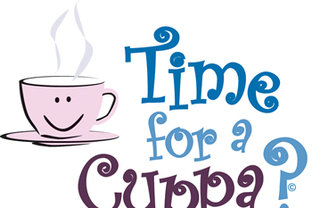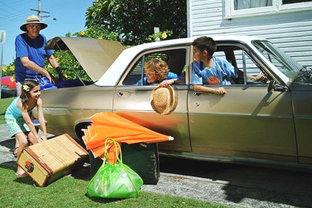
Proverb of the week No. 5
... Dzisiaj kolejne przysłowie, tym razem związane z książkami. Przysłowie angielskie: You can’t judge a book by its cover. Objaśnienie: It is what you say when you mean that you cannot judge the ...

... Dzisiaj kolejne przysłowie, tym razem związane z książkami. Przysłowie angielskie: You can’t judge a book by its cover. Objaśnienie: It is what you say when you mean that you cannot judge the ...

... . We are not going. You are not going. They are not going. Now do you understand? PUPIL: Sure, teacher. Nobody ain't going. TEACHER: Why should we never use the word “ain't?” PUPIL: Because it ain't ... correct. TEACHER (to the class): ...

... it? howzat?= how is that? innit?= isn’t it? whaddyacallit= what do you call it? betcha= bet you (I betcha can't eat ten hot dogs) getcha= get you (I'll getcha a drink.) doncha= don’t you (Doncha know ... ?) didja/didya= did you (Didja like the ...

... normal parts of growing up. So what can you do to help yourself adjust physically and emotionally? Here are some ideas. 1.1. _____It's natural to look at our friends. But it's not a good idea. Everyone ... develops differently and at different ...

... szybkiej mowy rzadko pojawiają się w piśmie. Można je jednak spotkać w komiksach lub tekstach piosenek. Ich zapis odzwierciedla sposób wymowy, np.:What are you going to do?Whatcha going to do?Whatcha ... gonna do? lubDo you want a beer?Do you ...

... to smoke. – Dawniej nie paliłem.Did you use to smoke?/Used you to smoke? (rzadziej) – Czy dawniej paliłeś?Didn’t you use to smoke?/Used you not to smoke? (rzadziej) – Czy dawniej nie paliłeś?You used ... to smoke, didn’t you? – Kiedyś paliłeś, ...

... odgadnąć brakujące fragmenty – z pamięci lub słuchając nagrania. Chorus: Last Christmas I gave you my heart, But the very next day you gave it away. This year, to save me from tears, I’ll give it ... to someone special. /x2 Once bitten and twice ...

... do tworzenia pytań (I have a cat. → Do you have a cat?, You saw him. → Did you see him?) i negacji (I saw him. → I didn't see him., She has a cat. → She doesn't have a cat.) oraz do wzmacniania znaczenia ... jako czasownika zwykłego i ...

... . Five Things You Should Not Say to Someone:“You’re fat.” “You’re very big.” “You’ve gained weight.” “You must have a lot of money.” “You’re a redneck.” Also, never make comments about someone’s ... person how big or small they are. Five Things ...

... , że prawidłowo zrozumiałeś, możesz: · poprosić o powtórzenie: Could you repeat, please? · poprosić o wyjaśnienie lub przeformułowanie pytania: I don’t understand.I don’t quite get what you mean ... . · zadać pytanie, aby uzyskać ...

... , zawiązać)dress down– to wear clothes that are more informal than the ones you would usually wear (ubierać się niezbyt starannie)dress up– 1) to wear clothes that are more formal than the ones you would ... jewellery so that you are wearing it; ...

... Wakacje w pełni i pewnie żaden uczeń nie tęskni za szkołą. Prezentujemy kilka zabawnych dowcipów z serii „humor szkolny”. TEACHER: Dorothy, what did you write your report on? PUPIL: A piece of ... paper. TEACHER: Fred, the story you handed ...

... , let alone perfectly. This is sad. My only consolation being that nobody speaks English perfectly. If you live here long enough you will find out to your great amazement that the adjective ‘nice’ is ... not the only adjective that the language ...

... – Shall I make you some tea? FUTURE CONTINUOUS 1. Czynności w toku w określonym momencie w przyszłości – At this time tomorrow I will be taking my driving test. 2. Czynności lub stany, które w przyszłości ... zaistnienia czynności przyszłej (bez ...

... trip easy and uneventful. Consider your starting point and desired destination, and investigate several possible routes. Remember, it's likely that you won't be the only person on the road during the ... holidays, and traffic is always a factor. ...

... you?” – śmiało proponuje kolega. – Kiedy on pisze Ci: „Do you like swimming?”, pytasz go: „And you?” Musi odpisać: „I like swimming.” Wtedy ty: „I like swimming too.” Wskazówki sprawdzają się. Po pewnym ...

... the way – Swoją drogą C CSY Can't Stop Yawning – Nie mogę przestać ziewać CUL Catch You Later (Goodbye) – Złapię cię później (Do zobaczenia) CUL8R See You Later ... – Do zobaczenia później CWYL Chat ...

... ilustrujące ich użycie oraz podaliście inne przykłady. Poniżej kolejne formy slangowe.ya = you See ya! dunno/donno = don’t knowda= the I was in da club. ‘bout = aboutwassup/wazzup = What’s up ... ? (How is it going?/How are you?) ...

... being fixed for the next day. During that time we regret that you will be unbearable.In a Leipzig elevator: Do not enter the lift backwards, and only when lit up.In a Paris hotel elevator: Please ... leave your values at the front desk.In a ...

... – great2DAY - today2MRO – tomorrowB4 – beforeEZ – easyNE –any4U – for you Wreszcie, stosowane są pierwsze litery słów na oznaczenie utartych zwrotów. Poniżej słowniczek najczęściej spotykanych.ATM ... – at the momentBRB – be right backBTW – by ...

... to somebody (do kogoś) / for something (za coś) / that (że). Możemy także używać synonimu apologize for something (za coś) / to somebody (kogoś).Go and say sorry to your sister that you broke her pencil. Idź ... , jest swallow your pride — ...

... of exam anxiety comes from a fear of poor performance. If you can test yourself adequately prior to an exam and go in with the knowledge that you do know your stuff, you might find your anxiety ... you come into contact with somebody who is very ...

... go w sytuacji, gdy chcemy powiedzieć po prostu tak lub gdy akceptujemy konkretną ofertę czy prośbę.Przede wszystkim mówimy tak w sytuacji, gdy ktoś zadaje nam pytanie:Have you been waiting here long? Yes ... , over two hours Czy czekasz tu od ...

... makes Jack a dull boy. Objaśnienie: Something you say when you mean that people who work all the time become boring. It is not good to work all the time. Polski odpowiednik: Nie ...